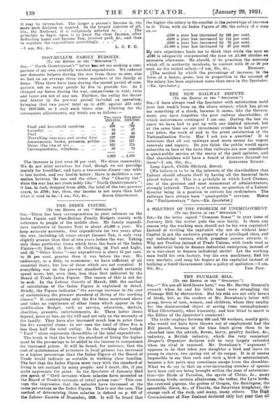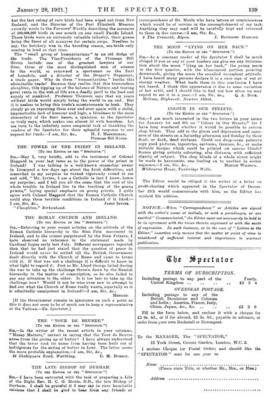THE PLUMAGE BILL.
[To THE EDITOR OF THE " SPECTATOR."] SIR,—" We are all bird-lovers here," was Mr. Bartley Denniss's- remark when he and his little band were strangling the Plumage Bill by obstruction. But his side are not only lovers of birds, but, as the readers of Mr. Downham's letter will grasp, lovers of men, women, and children, whom they employ for the disinterested object of saving from unemployment. What Christianity, what humanity, and how blind to merit is the Editor of the Spectator's comment!
The trade employs between 600 and 700 workers, mostly girls, who would not have been thrown out of employment had the Bill passed, because of the time limit given them to be absorbed into the ostrich, flower, berry, poultry feather, &c., industry, a British industry, which the very competent Draper's Organizer declares will be very largely extended when its rival is removed. Mr. Downham's " argument " appears to be that when you slaughter a bird and leave its young to starve, two spring out of its corpse. It is of course impossible to say that such and such a, bird is exterminated, because a few pairs may sometimes escape from the shambles. What we do say is that an ever-increasing number of species have been and are being brought within the zone of extermina- tion—the Birds of Paradise, the egrets of China, &c., many humming birds, certain albatrosses, the todies, the Lyre birds, the crowned pigeons, the grebes of Oregon, the flamingoes, the spoonbills, ibicee, &c., of Florida, the Smyrnian kingfisher, the orange cock of the rock, and many, many others. The High Commissioner of New Zealand declared only last year that all
but the last colony of rare birds had been wiped out from New Zealand, and the Director of the Port Elizabeth Museum recently wrote to the Farmers' Weekly describing the massacre of 200,000,000 birds in one month on one small Pacific Island. These birds were an extremely valuable industry, their guano being the finest of all manures for certain crops. Needless to say, the butchery was in the breeding season, sea-birds only coming to land at that time.
The "small group of humanitarians" is an old dodge of the trade. The Vice-Presidents of the Plumage Bill Group include one of the greatest lawyers of our time, three of the most distinguished men of science in the world, so renowned a sportsman as the Earl of Lonsdale, and a director of the Draper's Organizer, a trade paper. Why do these " humanitarians " loathe this abominable trade? Because they realize that this tremendous slaughter, this tipping up of the balance of Nature and tearing great rents in the web of life are a deadly peril to the food and supply of mankind. Professor Thomson says that six years without birds would simply bring the world to an end. But it is useless to bring this trade's misstatements to book. They simply go on repeating them over and over again with a stolid, impenetrable lack of humour and logic, a blindness to the most elementary of the finer issues, a cynicism, as the Spectator so truly says, which makes one almost ill with boredom. Let me turn to the infinitely more congenial task of thanking the readers of the Spectator for their splendid response to our request for funds.—I am, Sir, &c., H. J. MsssmonAm,
Plumage Bill Group.



































 Previous page
Previous page